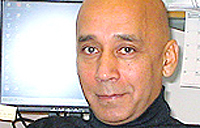York education and anthropology Professor Daniel Yon will discuss “The Spectacle of Race and the Making of Racial Identity in Late 19th Century St Helena” as part of the Tubman Speaker Series.
The talk will take place Thursday, March 6, from 3:30 to 5pm, at 280A York Lanes, Keele campus.

In April 1897, Mary Ann George left the Island of St Helena aboard the SS Arabic, bound for Hamburg, Germany, to be displayed as a specimen native of St Helena. The St Helena Guardian expressed outrage in reporting this departure.
The outrage was not about the ethics of human exhibitions – this was the age of exhibitions, and readers and columnists of the paper would have been aware of these 19th century “scientific” and national cultural practices, says Yon. Instead, the outrage had to do with the question of legitimacy and respectability: Mary Ann George was taken from prison, where she has begun another sentence for “disorderly behaviour”. Described, disparagingly, as “an African” and “fowl-mouthed” with a “renowned bad character”, the Guardian’s outrage had to do with the spurious grounds on which Mary Ann George was selected and the “bad taste” on the part of the person who selected her.
In this talk, Yon will examine the case of Mary Ann George to reflect upon the discursive making of race and identity in the creolized 19th-century St Helena, and against the island’s legacy of slavery. Importantly, the majority of slaves were from India and the Indian Ocean Basin, as was the history of slavery in the British Colony of the Cape, South Africa.
By the time of emancipation in 1833-1834, the line between free and un-free labour was often blurred. After emancipation, the patrolling of the high seas by the British navy and the setting up a Vice Admiralty Court on St Helena, for the suppression of the slave trade, produced the “spectacle” of the arrival of “liberated” Africans.
Following Schwarcz (1993), Yon will draw upon the idea of race and races as spectacle to examine the effect invoked by the arrivals of liberated Africans and their place in the making of local ideas of race and belonging.
Yon is the former director of the Graduate Program in Social Anthropology. He is also an honorary research associate at the University of Cape Town. Yon was born on the Island of St Helena where, after studying in the United Kingdom, he taught history and was a founding member of the island’s Heritage Society.
His research and teaching interests include school ethnography, anthropology of race and racism, diasporas and cosmopolitisms, anthropology and film. He is the author of Elusive Culture (SUNY 2000), an ethnography of youth, schooling and identity in “global” times. His two films, One Hundred Men and Sathima’s Windsong, came out of a larger ongoing project on the making of the South Atlantic world. His most recent work focuses on aesthetics and the apartheid archives.


